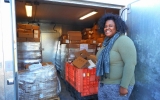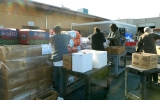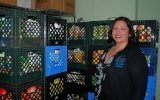The County of San Mateo and community groups from Daly City to East Palo Alto are joining forces to provide fresh and healthy food to individuals and families in need
Do you want to know where Measure K tax dollars are being invested?
Check out this chart to view each initiative and to see how local funds are supporting local needs in San Mateo County.

LaKesha Roberts-Evans says Measure K funds helped to purchase this walk-in freezer at the Ecumenical Hunger Program in East Palo Alto.
Volunteer: The tuna is inside the box. Here are your extra eggs.
Client: Thank you.
Narrator: Those are the voices of a busy volunteer and a client outside the Ecumenical Hunger Program in East Palo Alto. Men and women, many with small children, are waiting to receive boxes filled with bananas, fresh vegetables, eggs, bread, canned goods and more. The program’s LaKesha Roberts-Evans explains they’ve seen a steady rise in the number of individuals and families seeking food.
Roberts-Evans: We were serving 25 to 45 families about a year and a half ago. Since then we’re serving anywhere from 95 to 140 families a day.

Crews install a modular building that will serve as the new pantry at the Pacifica Resource Center.
Narrator: Many residents of San Mateo County are enjoying a wave of tech-fueled prosperity. But more than 73,000 residents, or roughly 10 percent of the population, relies on a network of food pantries for basic necessities and to stretch their modest incomes.
To meet this demand, the San Mateo County Board of Supervisors has provided $300,000 to help local pantries expand and improve their ability to store food, particularly the fresh fruits and vegetables that are keys to a healthy diet. The Ecumenical Hunger Program installed a new walk-in cooler and walk-in freezer with grant funds.
Nonprofit agencies that have improved food storage and distribution with assistance from Measure K:
| Agency | Items | Cost |
|---|---|---|
| Ecumenical Hunger Program -- East Palo Alto | Walk-in cooler and freezer | $109,953.00 |
| Edgewood Center -- San Carlos | 1-door reach-in refrigerator | $2,988.92 |
| Macedonia Food Pantry -- San Mateo | Upright Freezer | $764.74 |
| Pacifica Resource Center -- Pacifica | Site work, storage building | $114,719.54 |
| Schools, Second Harvest partners | Thermal Blankets (to keep food at proper temperature during transport | $1,500.75 |
| St. Vincent de Paul North County -- South San Francisco | Venting, air hood for stove | $69,130.00 |
| Pan de Vida -- Redwood City | Kitchenware | $1,484.94 |
| Total | $300,541.89 |
Roberts-Evans: So right now we’re in the food pantry. We’ve actually expanded this space as our overflow so you can see there are lots of pallets that come in from the food bank. We have items that we’ve had to purchase to get ready for our Christmas distribution. We have our walk-in refrigerator and our walk-in freezer which are amazing.
Narrator: In all, six pantries have made upgrades with County grants. The funds come from Measure K, a half-cent countywide sales tax approved by voters in 2012 and extended for an additional 20 years in November 2016. The funds were first provided to Second Harvest Food Bank, which in turn provided the funds to help its network of local food pantries.
Julia Douglas of Menlo Park is a widow on a fixed income. She relies on her local pantry for fresh food and also volunteers to help others in need.
Douglas: It's a lot of people hungry. I mean a lot of people have a lot of pride but they still come. Some people, we go take them food because they have no means to get it, just the little bit they can carry in their hands.
They love the vegetables, they love – to tell you the truth, they love it all.

Workers and volunteers unload pallets of food in the parking lot at the Ecumenical Hunger Program in East Palo Alto.
Narrator: The Pacifica Resource Center built an entirely new pantry with a combination of Measure K grant money and donations. Director Anita Rees explains.
Rees: The fact that every Tuesday we have a food line is pretty significant. These are folks who need food and are coming here to get it. I think because it’s so expensive to live here, people are needing extra help with these other things. We don’t always think about food as a way to increase somebody’s income. But it is a way to increase somebody’s income.
We had one gentleman tell us that the food that he gets, and he primarily uses just our drop-in food program, but the food that he gets from us actually saves him anywhere from $400 to $500 a month on food. So that money can then be used for other things, other expenses, whatever it is he needs to make ends meet.

Anita Rees of the Pacifica Resource Center.
Narrator: One of her clients, a woman named Maria, said her family fell on hard times when her husband was out of work for months following surgery. The tomatoes, soup, beans and other food they have received have helped ensure their young daughter has nutritious meals as they recover from the economic setback.
Maria: We are always thankful for this place.
Narrator: Measure K funds have also helped to improve a kitchen at St. Vincent de Paul in the North County, buy an upright freezer at the Macedonia food pantry in San Mateo, purchase kitchen items for Pan de Vida in Redwood City and install a new freezer and refrigerator at the Edgewood Center in San Carlos.
Back at the Ecumenical Hunger Program, one of the clients dabbed tears at her eyes as she talked about the struggles to feed her family in a county where average rents have risen more than 35 percent in the past four years and housing prices are among the highest in the nation.
Client: I can’t tell you how tough this is to live in. I can’t afford it. I have to stay with all my kids and help to pay for the rent. And to save some extra money to get some food from here, it’s a lot. It helps us to pay for the PG&E and other stuff in the house we need to supply.
Narrator: To learn more about Measure K, visit San Mateo County’s website at www.smcgov.org.
Volunteer: I need a large.
Volunteer II: Who’s the next, please? Can you see who’s the next?
Volunteer: Two larges.

Fruit, eggs and other nutritious and fresh food waits for clients at the Ecumenical Hunger Program. Measure K funds helped to improve food storage.